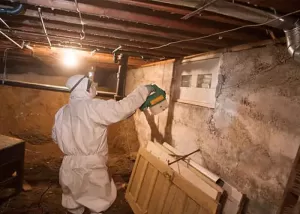
Crawl spaces might not be the most glamorous part of your home, but they hold the key to its health and safety. From hidden water damage to pesky pests, this overlooked area can hide problems that could cost you big time if left unchecked. That’s why crawl space inspections are quickly becoming a must-have in smart home maintenance.
Homeowners are realizing that a little attention here can prevent major headaches later. Regular inspections not only protect your investment but also improve your home’s energy efficiency and air quality. Whether it’s spotting moisture issues before they lead to mold or identifying structural concerns early, this proactive approach is a game-changer.
In today’s world, where every detail of home care matters, keeping an eye on your crawl space isn’t just practical—it’s essential. Let’s dive into why this trend is catching on and how it can benefit your home.
What are the Benefits of Scheduling Regular Crawl Space Inspections For Your Home?
Crawl space inspections offer several benefits that make them an essential part of home maintenance. These inspections not only ensure that the area remains free from water damage, pests, and other threats but also contribute to the overall comfort and efficiency of your living space.
Early Detection of Issues
One of the primary advantages of scheduling regular crawl space inspections is early detection. Many issues related to crawl spaces, such as water damage, mold growth, and pest infestations, are slow to develop but can become major problems if left unchecked. By performing routine inspections, homeowners can identify these issues before they escalate into costly repairs.
- Preventing water damage: Crawl spaces are vulnerable to moisture intrusion, which can lead to significant damage if not addressed early. Inspections help detect any signs of water buildup or leaks, allowing homeowners to take corrective action before the water causes structural damage or mold growth.
- Mold and mildew prevention: Regular inspections can help identify signs of mold and mildew in the crawl space, which can then be remediated before it spreads to other parts of the home. This can help prevent respiratory issues and ensure healthier indoor air quality.
Enhanced Energy Efficiency
A well-maintained crawl space contributes to a home’s energy efficiency by regulating temperature and preventing drafts. Regular inspections help ensure that insulation and vapor barriers are intact, which helps maintain a comfortable and energy-efficient living environment.
- Proper insulation: Insulation in the crawl space helps prevent heat loss in winter and keeps your home cooler during the summer months. Inspections ensure that the insulation is correctly installed and hasn’t been damaged or shifted.
- Improved air circulation: Crawl space inspections can help identify issues with ventilation, which can affect the temperature and humidity levels in your home. Proper ventilation in the crawl space promotes better airflow, preventing dampness and reducing energy costs associated with heating and cooling.
Structural Integrity
Crawl spaces house vital components of a home, including plumbing, electrical systems, and the foundation. Regular inspections ensure that these critical components remain in good condition, contributing to the overall structural integrity of the home.
- Protecting the foundation: If water infiltration occurs in the crawl space, it can weaken the foundation of the home, leading to costly repairs down the line. Inspections help ensure that the crawl space is dry, reducing the risk of foundation damage.
- Plumbing and electrical systems: The crawl space also houses many plumbing and electrical components that are difficult to access. Regular inspections can identify leaks, cracks, or wiring issues that may otherwise go unnoticed, helping to prevent more significant damage.
How Do Crawl Space Inspections Contribute to the Overall Health of a Home?
While crawl space inspections are often seen as a secondary concern, they have a direct impact on the overall health of a home. A healthy home is one where all parts work together harmoniously, and the crawl space plays a key role in maintaining a safe and comfortable living environment.
Mold and Indoor Air Quality
The most significant health concern related to crawl spaces is mold. Moisture buildup in a crawl space can lead to the growth of mold and mildew, which can easily spread to other parts of the house.
Mold is known to cause respiratory issues, allergies, and other health problems, particularly in individuals with weakened immune systems or asthma. By scheduling regular crawl space inspections, homeowners can catch mold growth early and take steps to address it before it affects indoor air quality.
- Preventing mold spread: Early detection and remediation of mold in the crawl space prevent it from spreading to the floors and walls of the living area, protecting the health of everyone in the home.
- Better air quality: Moisture and mold in the crawl space can affect the air quality in the entire home. A dry, well-maintained crawl space prevents airborne allergens and contaminants from circulating throughout the house.
Pest Control
Crawl spaces are often home to pests, such as rodents, termites, or insects, that can damage the home’s structure and pose a health risk. A regular inspection can help identify any pest activity in the crawl space, allowing homeowners to address infestations early before they cause significant damage.
- Preventing infestations: Inspections can identify cracks or gaps in the crawl space that may allow pests to enter, ensuring that the home remains sealed and protected from intruders.
- Structural damage: Pests like termites can cause significant damage to wood structures, including the home’s foundation and beams. Regular inspections ensure that any signs of infestation are caught early, preventing extensive damage to the home.
Allergens and Moisture
Excess moisture in the crawl space can lead to a range of environmental health concerns, including increased levels of dust mites and allergens. These particles can make their way into the home, affecting indoor air quality and exacerbating allergies and asthma.
- Healthier indoor environment: A dry and properly ventilated crawl space helps minimize moisture levels, reducing the number of allergens and improving the quality of air in the home.
- Reduced asthma triggers: By eliminating moisture and mold buildup in the crawl space, homeowners can reduce asthma triggers and improve the overall health of the household.
Why are Crawl Space Inspections Considered Essential in Modern Home Maintenance?
In today’s world, modern home maintenance goes beyond just checking for obvious issues such as leaks or electrical problems. Homeowners are increasingly aware of the importance of proactive care, and crawl space inspections are becoming an essential part of this approach. As homes become more energy-efficient, airtight, and designed for longer lifespans, the crawl space must also be maintained to ensure the integrity and health of the property.
Preventing Long-Term Damage
In many cases, issues in the crawl space, such as water infiltration, mold, and pest infestations, may not immediately affect the home’s livability. However, left unchecked, these problems can result in long-term damage that can be expensive to repair. By conducting regular inspections, homeowners can prevent these hidden problems from becoming major headaches.
- Early detection of structural issues: Structural problems caused by moisture, pests, or foundation shifts can remain hidden for months or even years. Regular inspections provide early detection, reducing the potential cost of future repairs.
- Avoiding costly repairs: Proactively maintaining the crawl space prevents problems from worsening and helps to avoid large-scale repairs down the road, saving homeowners money in the long term.
Energy Efficiency and Sustainability
As the world continues to prioritize energy efficiency and sustainability, homeowners are increasingly seeking ways to reduce their carbon footprint and minimize energy waste. Crawl space inspections help ensure that the home remains energy-efficient by addressing insulation issues, moisture problems, and ventilation deficiencies that can drive up heating and cooling costs.
- Optimizing energy use: Ensuring that the crawl space is properly insulated and ventilated reduces the workload on heating and cooling systems, improving energy efficiency and reducing utility bills.
- Sustainability: Properly maintaining the crawl space is part of a broader sustainability strategy that focuses on reducing waste, energy consumption, and the home’s overall environmental impact.
What Issues Can Be Identified During a Professional Crawl Space Inspection?
A professional crawl space inspection goes beyond a simple visual check—it involves a thorough examination of all aspects of the space to identify potential issues that could impact the health, safety, and longevity of the home.
Moisture and Water Infiltration
One of the most common issues that professionals look for during a crawl space inspection is water infiltration. Excess moisture can lead to mold, wood rot, and weakened foundation materials.
- Signs of flooding: Inspectors check for signs of flooding, water stains, or pooled water in the crawl space, which could indicate a drainage issue or foundation leak.
- Condensation and humidity levels: High humidity levels in the crawl space can lead to mold growth, so inspectors assess the humidity and condensation to identify potential problems before they escalate.
Insulation and Ventilation Issues
Proper insulation and ventilation in the crawl space are essential for energy efficiency and moisture control. A professional inspection can identify gaps in insulation or inadequate airflow, which can lead to increased energy costs and moisture buildup.
- Inadequate insulation: Inspectors look for areas where insulation is damaged, missing, or improperly installed, which could result in drafts and energy inefficiency.
- Poor ventilation: A lack of ventilation in the crawl space can lead to high moisture levels and poor air quality. Inspectors assess the ventilation system to ensure optimal airflow.
Structural Integrity and Pest Activity
Finally, a professional inspection examines the structural integrity of the crawl space and looks for signs of pest activity, which can compromise the safety of the home.
- Foundation damage: Inspectors check for cracks or shifts in the foundation, which can be caused by moisture, settling, or structural issues.
- Pest infestation: Professionals look for signs of pest activity, including droppings, nests, and damage to wooden structures, which can indicate an infestation.
Crawl space inspections have become an essential part of modern home maintenance. They not only protect the home from structural damage but also improve the overall health, energy efficiency, and comfort of the living environment.
By investing in regular crawl space inspections, homeowners can catch potential issues early, reduce stress, and ensure the long-term stability and value of their property. As the standard for smart home maintenance continues to evolve, crawl space inspections are quickly becoming a non-negotiable part of proactive homeownership.
Ensure Your Home’s Health with a Professional Crawl Space Inspection Today!
Don’t let hidden issues in your crawl space jeopardize the safety, comfort, and efficiency of your home. At Freedom Crawlspace Services, our expert team provides thorough crawl space inspections to identify potential problems before they escalate. From moisture control and insulation checks to detecting structural issues and pest infestations, we ensure your home stays secure and efficient year-round.
Take the first step toward a healthier, more energy-efficient home by scheduling your inspection today. Don’t wait for problems to arise—ensure peace of mind with a professional crawl space inspection from Freedom Crawlspace Services!
